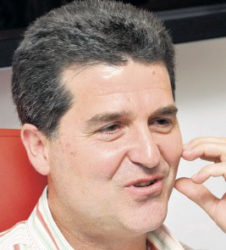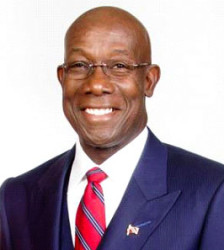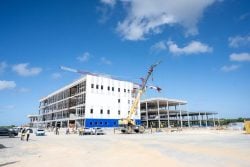Bilateral exchange between two of the Caribbean Community’s (Caricom) more influential states, Trinidad and Tobago and Jamaica to settle long-outstanding and increasing acrimonious trade and immigration issues would appear to be accelerating in the wake of the recently concluded regional Heads of Government summit in Georgetown.
Reports from the Jamaican capital Kingston, earlier this week, indicated that following a post-summit visit to Jamaica by Trinidad and Tobago Prime Minister Dr Keith Rowley, the Foreign Ministry in Kingston was making arrangements for a swift return visit.
At the Georgetown meeting, Caricom Heads, including President David Granger, had signalled the regional movement’s concern that the two member countries get on with the business of settling their simmering differences in order that Caricom could return, collectively, to confronting the more urgent common issues facing the region. Granger had specifically dismissed the notion that the rift between the two member states might lead to a more serious fracture in the movement.
There has, however, been some concern that the Jamaican private sector and notably its influential Private Sector Organization of Jamaica (PSOJ) Chair-man William Mahfood had worked up a considerable head of steam over what the Jamaican business community had said was the protectionist tendencies of Port of Spain in relation to the importation of goods from Jamaica. The PSOJ had dropped broad hints that the fact that Jamaica was the single largest regional importer of goods from Trinidad and Tobago meant that the country was not retaliatory a measure of retaliatory clout though the Jamaican government had sought to pour cold water on the idea of any retaliation.

Bilateral trade aside Jamaica has, for some time now, been bristling over what the government in Kingston says is the inhospitable treatment of Jamaicans visiting Trinidad and Tobago.

Earlier this week, Mahfood, who will likely be the key Jamaican private sector official on the Jamaican delegation to Port of Spain was reported as saying that the visit will offer the opportunity for a proper assessment of the value of Dr Rowley’s recent visit to Jamaica. “That trip will specifically highlight the items that were issues that needed to be addressed whether on the immigration side or trade and energy and fuel. Once those items are addressed then I would say there is opportunity to say, once and for all, yes Caricom is going to be successful or not,” Mahfood is quoted in the Gleaner as saying. The remark will now focus particular concern on the outcomes of the visit by the Jamaican delegation to Port of Spain since Mahfood’s statement would appear to suggest that he is of the view that those outcomes are likely to have a critical bearing on the cohesiveness of the regional government, going forward.
Mahfood did say, however, that he had been encouraged by the approach of Dr Rowley during his five-day stay in Kingston and that much now depends on adherence to commitments made during that visit.
“Prime Minister Rowley came here with an approach that was very positive and very forthcoming — to say that he came to resolve these issues. Once he fulfils some of those promises, then I think that it is just a matter of going through that checklist and ticking off the boxes,” Mahfood is quoted in the Gleaner as saying.
Aspects of the return visit will likely centre around more conventional bilateral discourse at a Foreign Ministry level focusing in protocols and procedures associated with the treatment of visiting nationals, a matter in which the rest of the region also has vested individual interests.




